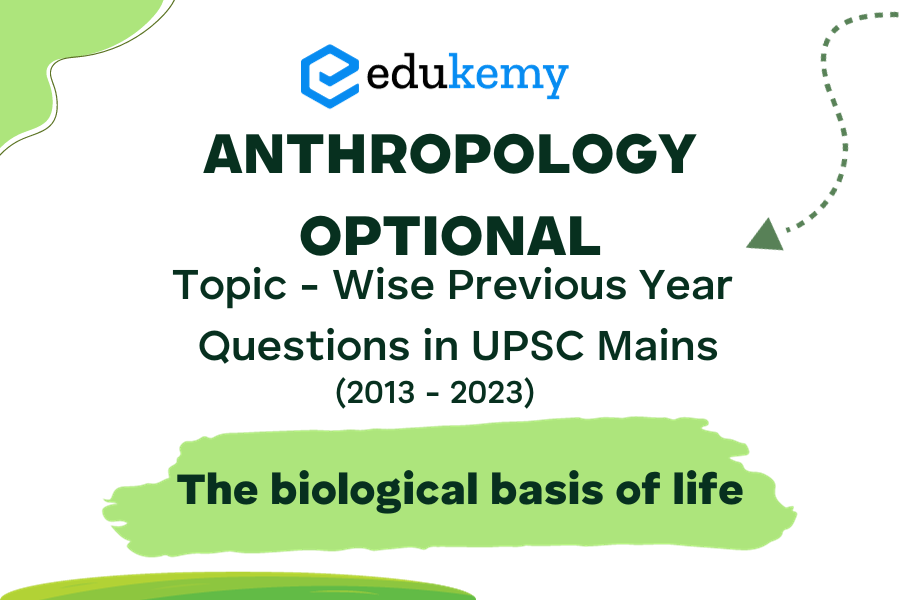
As we delve into the intriguing realm of Anthropology, one of the optional subjects in the UPSC Mains examination, the exploration of the “Biological Basis of Life” becomes a pivotal focus. This niche within Anthropology offers a profound understanding of the biological aspects that shape human existence, evolution, and variability. Over the past decade, the UPSC Mains has consistently posed challenging questions on this topic, making it imperative for aspirants to thoroughly grasp the intricacies of the biological foundations of life. In this blog series, we embark on a comprehensive journey through the previous year questions from 2013 to 2023, unraveling the evolving trends, key themes, and nuances that the UPSC has emphasized. Whether you are a seasoned aspirant revisiting the subject or a newcomer seeking insights, join us as we dissect the Anthropology optional landscape, offering valuable perspectives on navigating the challenges posed by the biological facets of human life.
In the ever-evolving landscape of the UPSC examination, staying abreast of past trends and patterns is indispensable. The “Biological Basis of Life” holds particular significance, not only for its intrinsic value in understanding human evolution but also for its recurrent appearance in UPSC Anthropology optional papers. This blog series aims to serve as a beacon for UPSC aspirants, illuminating the path to success by meticulously dissecting the questions posed in the last decade. By unraveling the intricacies of each question and providing insightful analyses, we empower candidates to not only grasp the subject matter but also to cultivate a strategic approach towards this nuanced optional topic. So, let’s embark on this intellectual expedition, where we bridge the past with the present to pave the way for a successful future in the realm of Anthropology.
Contents
- 1 The biological basis of life – Previous Year Questions (UPSC CSE Mains Anthropology Optional)
- 2 Frequently Asked Questions (FAQs)
- 2.1 1. Q: What is the significance of studying the biological basis of life in Anthropology?
- 2.2 2. Q: How does the biological basis of life contribute to the broader field of Anthropology?
- 2.3 3. Q: What are some key topics covered under the biological basis of life in Anthropology?
- 2.4 4. Q: How can aspirants effectively prepare for questions related to the biological basis of life in the UPSC Anthropology optional?
- 2.5 5. Q: Are there any recent trends or evolving themes in the UPSC Anthropology optional questions related to the biological basis of life?
- 3 In case you still have your doubts, contact us on 9811333901.
The biological basis of life – Previous Year Questions (UPSC CSE Mains Anthropology Optional)
The Cell, DNA structure and Replication, Protein Synthesis, Gene, Mutation, Chromosomes and Cell Division
1. Give an outline of the anthropological perspective of genetics and -critically evaluate the genetic significance of meiotic cell division. (1988)
2. Write a note on Genes (1992)
3. Write a note on Protein Synthesis (2008)
4. Write a note on Thrifty genotype.(2009)
5. Write a note in 150 words on Implications of mutation in evolution.(2019)
Frequently Asked Questions (FAQs)
1. Q: What is the significance of studying the biological basis of life in Anthropology?
A: Studying the biological basis of life in Anthropology is crucial as it provides insights into the evolutionary journey of humans, exploring topics such as genetics, primatology, and paleoanthropology. This knowledge is foundational for understanding the physical aspects that shape human existence and cultural development.
2. Q: How does the biological basis of life contribute to the broader field of Anthropology?
A: The biological basis of life serves as a bridge between biological sciences and social sciences, offering a holistic perspective on human diversity and adaptation. It aids in comprehending the intricate connections between genetics, behavior, and cultural practices, thereby enriching the overall understanding of human societies.
3. Q: What are some key topics covered under the biological basis of life in Anthropology?
A: Topics include human evolution, comparative primate anatomy, molecular anthropology, and the study of skeletal remains. Understanding these areas provides a comprehensive grasp of the biological foundations shaping human life, contributing to a well-rounded comprehension of Anthropology.
A: Aspirants should focus on building a strong foundation in core concepts, stay updated on recent research in biological anthropology, and practice solving previous year questions. Integrating interdisciplinary knowledge and critical analysis will enhance their ability to tackle diverse questions in the UPSC Mains.
A: Yes, recent trends suggest an increased emphasis on the integration of biological and cultural aspects. Questions often require candidates to apply biological principles to analyze cultural phenomena, reflecting the UPSC’s evolving approach towards a more interdisciplinary understanding of Anthropology.
In case you still have your doubts, contact us on 9811333901.
For UPSC Prelims Resources, Click here
For Daily Updates and Study Material:
Join our Telegram Channel – Edukemy for IAS
- 1. Learn through Videos – here
- 2. Be Exam Ready by Practicing Daily MCQs – here
- 3. Daily Newsletter – Get all your Current Affairs Covered – here
- 4. Mains Answer Writing Practice – here

